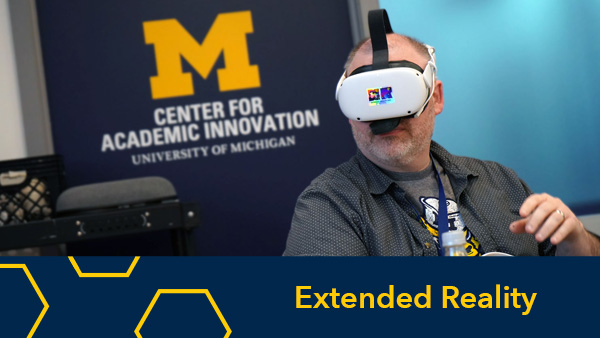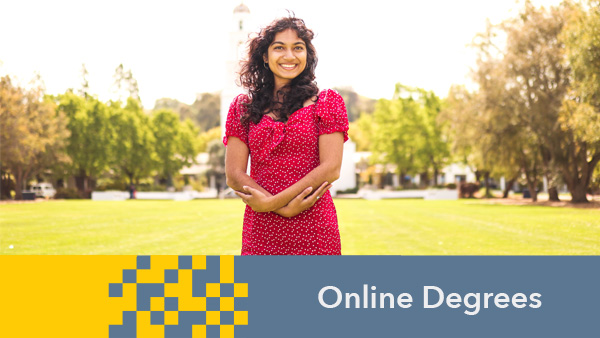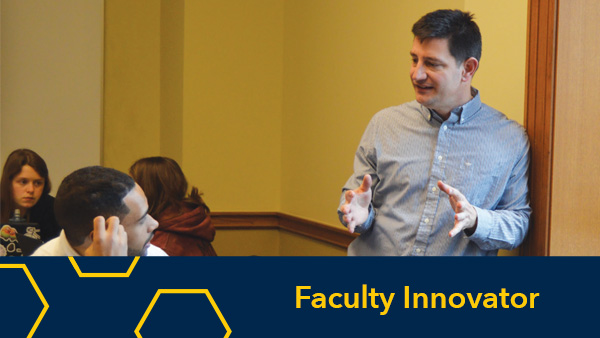Parnia Mazhar, Communications Writing Fellow
Marissa Reid, Student Programs Coordinator
University of Michigan students are deeply integral to our work.
Students support innovation at U-M by providing their honest feedback on improvements to our software tools, sharing their insight as important members of the U-M community, and participating in extensive, practical learning experiences through our student fellowship program. Through our fellowship program, we aim to provide students with enriching learning experiences while contributing to University of Michigan initiatives. Students in our program are immersed in a cross-functional work environment to design and develop software applications, enhance online learning experiences, and function in a number of other roles to support innovation at our center. This work enhances the residential education experience and facilitates engaged and personalized learning. Students collect and analyze data from these experiences to help the campus community make informed decisions and facilitate experimentation at the intersection of public engagement and innovation by pursuing different projects related to research. Currently, we have 42 fellows in the areas of Behavioral Science, Data Science, Compliance and Policy, Copyright, Design Management, Marketing and Communications, Software Development, User Experience Design, User Research, Business Development, Extended Reality, and Operations.
Expanding on our efforts to provide the U-M community with access to financial support for innovative projects through the Academic Innovation Fund (AIF), we are extremely pleased to announce the three student proposals selected for funding through the new Student Academic Innovation Fund. Launched in 2019, the Student Academic Innovation Fund encourages bold ideas, creative collaborations, innovative thinking, and fostering equity and inclusivity in the U-M community. Our center is excited to provide this opportunity to students and student groups because we understand some of the obstacles students face when trying to launch new, innovative projects.
This fund has helped to connect us to U-M students in new ways, extending beyond our long history of collaboration with students across campus. We are excited to share more information about the first three projects supported by the Student Academic Innovation Fund.
Student Government iClicker and Scientific Calculator Loan Program
In their proposal, students in the College of Literature, Science, and the Arts Student Government (LSA SG) identified that students on campus often face difficulty obtaining the proper equipment needed for their daily classes and exams. Examples of such equipment include scientific calculators and iClickers, or radio frequency devices that students use to answer questions professors ask in class. Purchasing such items can seem unreasonable to many students, especially because they often only need to use them for one or two classes or a limited number of exams during their academic career at U-M. This program is designed to help LSA students in need to access technology for class by providing them with an efficient, free service. LSA SG intends to work with LSA Technology Services to loan out iClickers and calculators to students for a short-term period of about three days.
Mixed Reality Historical Experience
A team of five students studying in four different schools at U-M will develop an innovative historical project for the university. Their focus is to make a historical event more engaging and interactive for viewers by utilizing mixed reality technology and a projection-based installation on U-M’s campus. Specifically, the project will create interactive graphics through the use of a Hololens, or a virtual reality headset with transparent lenses that allows viewers to experience augmented reality. These graphics will not only respond to user interaction, but will also work in conjunction with the projected environment to display information. This project will encompass augmented reality creation, architecture, user experience design, user interface design, historical research, and experimental presentation.
Michigan Code Academy
The Michigan Code Academy (MCA) is a learning community that empowers U-M students of all skill-levels to activate, advance, and apply practical technical skills. With the funding from Academic Innovation, it hopes to be a platform for Michigan Online to reach new audiences in the U-M community interested in developing their technical knowledge. MCA will do so by introducing new learning opportunities, such as a Hack-A-Thon, or a one day competition in fall 2020 where amateur coders interested in computer science will get together to solve problems and collaborate on software projects. MCA will also host trainings on how to use programming languages like R and SQL, as well as workshops on how to make presentations with Google Material Design.
We are excited to continue to provide funding to student groups this upcoming year. Recipients receive compensation for items to jump start their projects, including but not limited to: technical supplies, travel, printing, and software licensing. Any U-M Ann Arbor student or student team with impactful proposals for innovative projects are encouraged to apply. The next application deadline for Summer 2020 projects is March 13, 2020. Please visit our Student Academic Innovation Fund page for more information and contact Marissa Reid, Student Program Coordinator, at [email protected] with any questions.


